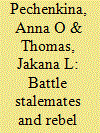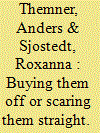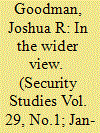|
|
|
Sort Order |
|
|
|
Items / Page
|
|
|
|
|
|
|
| Srl | Item |
| 1 |
ID:
171221


|
|
|
|
|
| Summary/Abstract |
This manuscript examines how battlefield events influence belligerents’ pursuit of negotiated settlements in civil wars. We argue that successive stalemates are most likely to precipitate rebel demands for negotiations because they offer groups both the opportunity and willingness to push for a compromise settlement. Unlike rebel losses, stalemated battles demonstrate that rebels can offer military resistance to the state. Yet, unlike rebel battle gains, draws do not raise the prospects of a rebel war victory. Using monthly data on rebel demands for negotiations and battle outcomes for 63 African dyads fighting between 1997 and 2010, we find support for this argument; more battlefield stalemates decrease the time until a proposal to negotiate by rebels. Additionally, we examine whether the same battlefield dynamics explain the onset of formal negotiations. The results reveal only a relationship between rebel battle gains and the onset of talks. The contrast in these findings suggests that rebels and governments may conceive of battlefield outcomes, especially stalemates, differently. Although rebels perceive a window of opportunity from a battlefield deadlock, governments appear to be influenced most by rebel gains.
|
|
|
|
|
|
|
|
|
|
|
|
|
|
|
|
| 2 |
ID:
171219


|
|
|
|
|
| Summary/Abstract |
Post–civil war democracies are characterized by intense electoral competition. To ensure continued political relevance, ex-military-turned-politicians, or “warlord democrats” (WDs), can either engage in a rhetoric of fear or ease societal tensions by employing a rhetoric of peace. WDs’ choice of rhetoric can have a profound impact on durable peace by altering societal discourses concerning the legitimacy of using violence. A key question is therefore: Why do some WDs employ a rhetoric of fear, and others a rhetoric of peace, when running for office? We argue that the choice of rhetoric is a function of the patrimonial endowments WDs possess; if WDs lack the resources and social networks needed to distribute patronage, they may instead use a rhetoric of fear to rally voters. To highlight the explanatory value of this proposition, we compare two Liberian WDs who ran for the Senate in 2005—Adolphus Dolo and Prince Johnson.
|
|
|
|
|
|
|
|
|
|
|
|
|
|
|
|
| 3 |
ID:
171223


|
|
|
|
|
| Summary/Abstract |
In 2014, the Obama administration announced that the United States would almost entirely adopt the global ban on antipersonnel (AP) mines, despite longstanding military and political opposition. To explain this puzzling outcome, I expand upon recent accounts of rhetorical entrapment in which norm-promoting actors seek to compel change in a target actor by exploiting tensions between the target’s words and actions. Tracing US policy change over the past 25 years, I show how transnational civil society and domestic political elites strategically deployed factual and normative claims to draw US officials into an iterative debate concerning the humanitarian harm of AP mines. Successive US administrations have sought to mitigate external critique by gradually conceding to the discursive framing of pro-ban advocates without endorsing the international treaty prohibiting the weapons. These rhetorical shifts stimulated a search for alternative technologies and incremental changes to military doctrine, tactics, and procurement that constrained US policy choices, culminating in the effective abandonment of AP mines despite ongoing military operations around the globe.
|
|
|
|
|
|
|
|
|
|
|
|
|
|
|
|
| 4 |
ID:
171224


|
|
|
|
|
| Summary/Abstract |
Expeditionary counterinsurgents often have trouble adapting to meet insurgent challenges, resulting in the adoption and retention of ineffective strategies. Whereas explanations often focus on military preferences and cultures, this paper argues civilian policymakers ultimately select counterinsurgency strategy from the recommendations of their advisors, and these strategies will reflect policymakers’ preferences. The goals and instruments of a counterinsurgency campaign are significantly shaped and constrained by policymakers’ foreign policy objectives and the geostrategic pressures they perceive. Strategy changes when geostrategic shifts render existing strategies liabilities for new foreign policy objectives; otherwise, existing strategies, consistent with existing goals, are likely to persist. A most similar comparison of British responses to two insurgencies in the Palestine Mandate, the Arab Rebellion (1936–39), demonstrating successful strategic adaptation, and the Jewish Rebellion (1945–47), demonstrating the failure to change ineffective strategy, reveal the role played by geostrategic pressures stemming from the onset and aftermath of World War II.
|
|
|
|
|
|
|
|
|
|
|
|
|
|
|
|
| 5 |
ID:
171222


|
|
|
|
|
| Summary/Abstract |
Covert regime change is a common instrument of statecraft states use to promote their national security interests abroad. This study employs an original dataset of all US-backed covert regime change attempts during the Cold War. It shows that the United States attempted far more regime changes than is commonly known because Washington intervened covertly—as opposed to overtly—ten times more frequently during these missions: sixty-four covert regime change attempts versus six overt. Building upon extensive archival research, the article then theorizes why the United States launched its Cold War regime changes, which types of international disputes are most likely to spark an intervention, and why American policymakers overwhelmingly preferred to intervene covertly during their regime-change operations. The results challenge existing theories of regime change and offer timely new insights into US foreign policy decision making.
|
|
|
|
|
|
|
|
|
|
|
|
|
|
|
|
| 6 |
ID:
171220


|
|
|
|
|
| Summary/Abstract |
Why did Argentina risk seizing the Malvinas/Falkland Islands by force in 1982, provoking a war against Great Britain, and what are the larger implications of this case? We revisit this influential episode using counterfactual analysis to interpret newly declassified declarations of high-ranking state officials involved in the decision to occupy the islands. These sources cast doubt on the diversionary-war and miscalculation theses of the Malvinas/Falklands War, among other extant interpretations. Evidence suggests long-term power dynamics and prospect theory better explain Argentine foreign policy behavior leading to the war. Due to aversion to tangible losses, the leadership of waning states like Argentina might favor risky military strategies despite their low expected utility. These biases may provoke a war if decision-making groups are small and isolated from de-biasing influences. Our explanation illustrates the value of prospect theory to understand why certain declining states behave aggressively and more plausibly explains the Malvinas/Falklands War when confronted to set-theoretic counterfactual analysis.
|
|
|
|
|
|
|
|
|
|
|
|
|
|
|
|
|
|
|
|
|